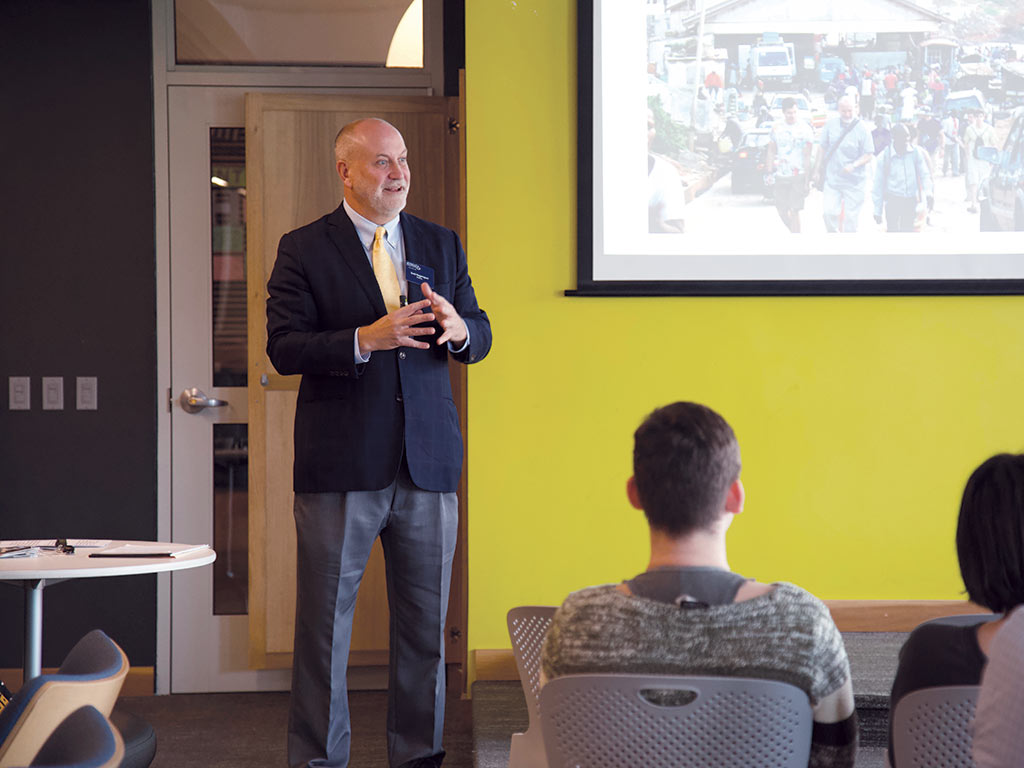Catalyze
When the College reopened for residential education in Fall 2020, staying at home on a personal device to protect yourself and others was standard. In a pre-pandemic year, 35–45 percent of Juniata students study abroad, sometimes more than once. As Juniata worked to confront these conflicting values of community safety and global education, we had to expand our definition of international education to provide strong opportunities for students right on campus.
This wasn’t the first time Juniata had thought about international education in novel ways, according to Provost Lauren Bowen. Despite many opportunities for Juniata students, things like cost, language proficiency, and the impact of global travel on climate can all be barriers to international experience. The pandemic expedited the development of new, robust ways to provide international education, and one of the methods embraced was Collaborative Online International Learning (COIL) courses.
Synthesize
COIL courses are immersive collaborations between two institutions, developed collaboratively by the partner professors.
The courses need not rely on shared language fluency and should encourage deep, cross-cultural interactions to meet the course objectives.
Professor of politics Emil Nagengast taught a COIL course on migration with Professor Alejandro Herran of the Autonomous University of Chiapas (UNACH), Mexico. The objective of the course was to find humanitarian solutions to migration policy issues. Three Juniata students were fluent in Spanish, but otherwise, the students had to work together to address the language barrier. Most of the Juniata class was politics students, while the UNACH students were mostly law or Ph.D. students.
Amy Rosica ’23 took the migration course after her study abroad program was canceled. She was surprised by how much of her pre-departure coursework applied to her experience in the COIL course.
“I experienced the culture shock that we learned about,” she says, describing the challenge of bridging the language barrier and noting the difference in perspective between the Juniata and UNACH students.
“You can sit in a class and be told that the U.S. has shaped international relations, but you don’t understand until you sit down with someone who has experienced that directly.” After the first meeting with UNACH students, Rosica paused, realizing how U.S. centric her views were.
Professor of Spanish and Hispanic Cultures Amy Frazier-Yoder also taught a COIL course, partnering with the Universidad San Francisco de Quito Ecuador. This class centered around gender, which can be a taboo topic. Frazier-Yoder reports that students from both universities saw more eye-to-eye than she expected. “Differences were great conversation topics,” she says, and the students had no trouble filling the course time as they learned from one another.
Energize
COIL courses cannot and should not be considered replacements for study abroad.
While many parts of life were on hiatus during the height of COVID, international education at Juniata was not. The adapted version brought new opportunities for cultural exchange, language practice, and trans-national connections to students like Amy who were extremely grateful for the experience.
As we move into our next “new normal” with travel opening, hosting scholars in residence again, and international students back on campus, COIL courses will continue to be an element of a rich, multi-faceted, international education for Juniata students across disciplines.





